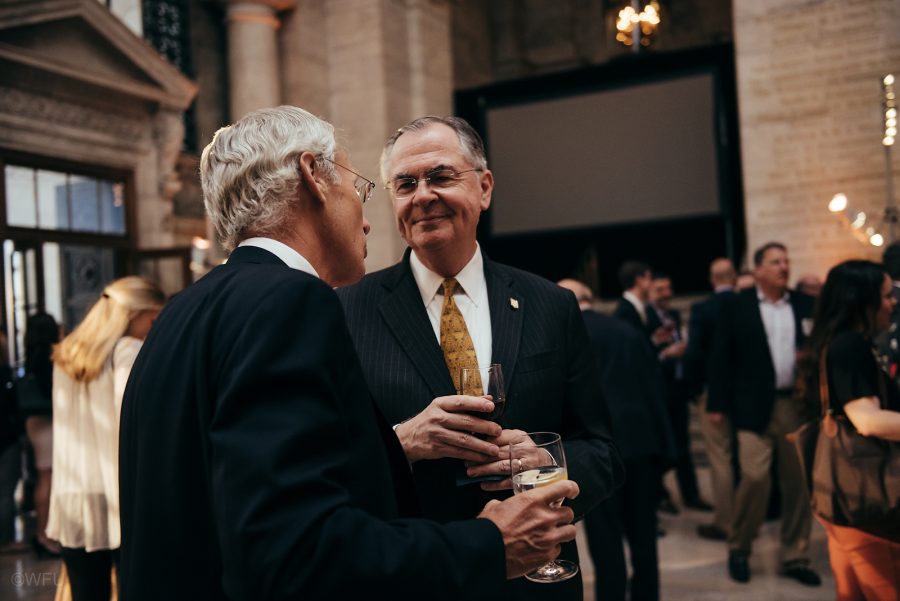On Tuesday, Wake Forest announced that the Wake Will Lead campaign had surpassed its $1 billion fundraising goal.
A $1.5 million gift from Arnold Palmer’s Trust, which is establishing the Winifred W. Palmer Professorship in Literature, pushed the capital campaign past the $1 billion milestone.
In an email to the Wake Forest community, President Nathan Hatch noted the coincidental, yet historic significance of the day this announcement was made. On Oct. 15, 1951, President Harry Truman helped then Wake Forest College break ground on the new campus in Winston-Salem.
“That historic moment, made possible by an act of incredible philanthropic support by the Reynolds family, expanded the horizons for what would become a nationally admired institution of higher education,” Hatch wrote. “Today, philanthropic support again gives us occasion to celebrate a historic milestone in the life of Wake Forest University.”
The $1.5 million gift from Arnold Palmer’s Trust is endowing a professorship in literature, awarded to Dean Franco. He has taught at Wake Forest since 2001 and currently serves as the director of Humanities Institute.
“I am deeply grateful for the gift from the Arnold Palmer Trust to endow this professorship in the name of Palmer’s late wife, Winifred,” Franco said. “Winifred loved literature, and this gift affirms her and the Palmer Trust’s commitment to supporting the study of literature at the heart of the liberal arts at Wake Forest. It’s easy enough to look around and see all the new buildings constructed with new donation funding, and this remarkable gift, bringing the capital campaign to its billion dollar goal, signals the equal significance of humanities teaching and research at Wake Forest.”
Brett Eaton, the executive director of the Wake Will Lead campaign, spoke to the importance of the Palmer Trust’s donation.
“The gift from the Palmer Trust was a decision made by Mr. Palmer’s daughters to honor the memory of their parents, particularly their mother and her love of literature,” said Brett Eaton, the executive director of the Wake Will Lead campaign. “I love that the gift that moved the campaign past the $1 billion milestone is linked to such a Wake Forest icon, and will support the work of such a remarkable Wake Forest faculty member, [Dean] Franco.”
The Wake Will Lead campaign launched in 2013. It surpassed the original $600 million goal in 2016 and set the now-achieved goal of $1 billion.
Close to 60,000 donors have contributed more than 500,000 individual gifts and commitments to the capital campaign. More than 70% of the gifts to the campaign were less than $1,000, and more than 2,200 current and retired faculty and staff contributed gifts totaling $36 million.
“In each gift, we see the great care of alumni, parents and friends for this special place,” said Mark Petersen, vice president for University Advancement, to Wake Forest News. “We will never take their personal investment for granted.”
The money from Wake Will Lead helps fund scholarships, academic positions and programs, the building and renovating of campus facilities. According to the webpage for the campaign, Wake Will Lead has reduced student debt by 30%, endowed 52 faculty positions and built or renovated more than 1 million square feet of campus space.
More than 200 scholarship funds, such as the Byrum Scholarships, the Stamps Scholarships, Wake Forest Scholars and Magnolia Scholars, have benefited from the Wake Will Lead campaign, according to Wake Forest News.
The Wake Will Lead campaign also helped make the renovation of Reynolds Gym possible, in addition to supporting other wellbeing initiatives on campus. Other renovations and buildings supported by the campaign include the Sutton Sports Performance Center and Shah Basketball Complex, Farrell Hall, the Worrell Law Commons, Davis Chapel and McCreary Field House.
The Wake Will Lead campaign will officially end on June 30, 2020. Eaton said that fundraising efforts will contitinue, with particular attention to academic departments in the liberal arts.
“Our fundraising staff is in conversations with donors about endowed or current-use funds supporting college academic departments and programs and initiatives in the professional schools and ZSR Library,” Eaton said. “Among our donor population, there seems to be growing interest in support for arts programming at Wake Forest. We are also seeing increasing support for unrestricted multi-year pledges through Wake Forest Giving Societies, which go to areas of greatest need.”
Will May also contributed to this article.
















